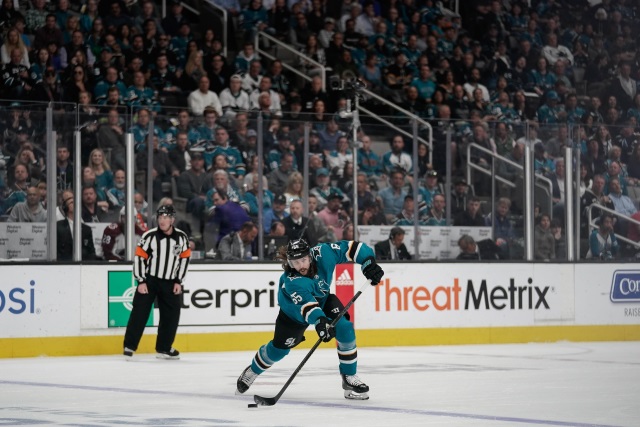The San Jose Sharks’ Stanley Cup hopes ended with their six-game elimination from the Western Conference Final by the St. Louis Blues.
Among the questions facing the Sharks in this offseason is the fate of Erik Karlsson. Acquired last September from the Ottawa Senators, the 28-year-old defenseman is slated to become an unrestricted free agent on July 1.
Shortly after dealing for Karlsson, Sharks general manager Doug Wilson expressed his willingness to re-sign the talented blueliner to a long-term contract extension. By midseason, however, both sides appeared to put that possibility on the back burner.
It appears Karlsson intends to test the free-agent market. Last week, he tweeted his thanks to his teammates, the Sharks organization and the club’s fans but made no mention of a return. Even if Karlsson wants to re-sign, the Sharks’ salary-cap constraints could make it impossible.
Re-signing Karlsson comes at a hefty cost. Speculation last year suggested the blueline could seek a deal comparable to Drew Doughty’s eight-year, $88-million contract with the Los Angeles Kings. That would be an $11-million annual bite out of the Sharks cap space.
Cap Friendly indicates the Sharks have over $58.2 million invested in 15 players for 2019-20. Assuming an $83 million salary cap next season, they’ll have over $24 million in cap space.
Karlsson, forwards Joe Pavelski, Joe Thornton, Gustav Nyquist, and Joonas Donskoi are eligible for UFA status on July 1. Their restricted free agents include Timo Meier and Kevin Labanc.
Even if Wilson could somehow convince everyone to accept below market value for their services, he still can’t afford to re-sign everyone.
Meier and Labanc are good young forwards coming off entry-level contracts. Pavelski and Thornton are long-time Sharks likely to be retained. Perhaps Donskoi can be squeezed in. That won’t leave enough for Karlsson and Nyquist.
If Karlsson has played his final game with the Sharks, there’s talk suggesting he would prefer returning to the Eastern Conference. He spent the bulk of his NHL career there during his tenure with the Ottawa Senators.
When healthy, Karlsson ranks among the NHL’s elite defensemen. He had 45 points in 53 regular-season games with the Sharks, as well as 16 points in 19 postseason contests
Karlsson’s a two-time winner of the Norris Trophy as the league’s top defenseman. He captained an underdog Senators team to within an overtime goal of reaching the 2017 Stanley Cup Final.
That resume usually commands top dollar. However, his recent injury history and the effect upon his performance could dampen his market value.
Heel and ankle surgery affected Karlsson’s performance in 2017-18. This season, a nagging groin injury sidelined him for 29 games and took him out of Game 6 of the Western Conference Final.
That’s not to suggest there won’t be interest in Karlsson on the open market. Despite his injury woes, he will get a substantial raise over his current $6.5 million annual average value.
ESPN.com’s Greg Wyshysnki and Chris Peters recently reported there’s chatter linking Karlsson to the New York Rangers. He and Rangers goaltender Henrik Lundqvist are old friends and the Blueshirts need a skilled first-pairing defenseman.
Last summer, the Tampa Bay Lightning reportedly looked into acquiring Karlsson from the Senators. Sportsnet’s Rory Boylen recently cited Chris Johnston speculating the Bolts might try again. He admitted, however, the cap-strapped Lightning must free up considerable space to get it done.
The New Jersey Devils and Philadelphia Flyers have lots of salary cap space and could use someone like Karlsson on their blueline. Ditto the Florida Panthers, though they’d have to ship out winger Mike Hoffman, who clashed with Karlsson during their final season with the Senators. Perhaps the Buffalo Sabres could also make a pitch.
Even with their salary-cap room, Karlsson’s spate of injuries could make those teams reluctant to invest too much for too long. Some could offer up a six- or seven-year deal for between $8-$9 million annually. Perhaps they’ll offer $10-$11 million per season on a four-year contract. Maybe one of them offers up $15 million annually on a two-year deal.
Whatever happens, the notion of Karlsson getting a Doughty-like deal seems further away now than it did a year ago.



